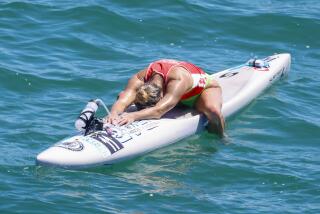SAILING CONGRESSIONAL CUP : Klein Thinks He Matches Up Pretty Well
As Larry Klein of San Diego presents his credentials as yachtsman of the year and prepares to dive into big-time match racing, wise old heads nod knowingly.
Even that prestigious award wonât earn him as much as a parking spot at the Long Beach Yacht Club, where sailors have gathered for the 26th Congressional Cup starting today.
Five of the other nine skippers--San Diegoâs Peter Isler, New Zealandâs Chris Dickson, Australiaâs Peter Gilmour, Houstonâs John Kolius and Japanâs Makoto Namba--have Americaâs Cup experience or ambitions, and two--Costa Mesaâs Robbie Haines and New Zealandâs Russell Coutts--have gold medals from the 1984 Olympics, along with several other successes internationally.
Mike Elias of Long Beach and Bill Lynn of Rye, N.Y., have the savvy of two previous Congressionals.
What Klein, the 37-year-old rookie, has is the â89 world J-24 and Etchells 22 championships, which won him recognition as Americaâs top sailor last year. Riding the crest, he then won the Ficker Invitational at Long Beach to qualify for the Congressional, and he hopes to parlay all of it into an Americaâs Cup campaign of his own.
âI donât have a lot to lose and everything to gain,â Klein said. âIâm not seen as a guy thatâs done a lot of match racing. Iâm a novice. Iâve done the Ficker and thatâs it, really. Our goal here is if we get (in the) top four, weâll be happy. If we get the book, weâll be unhappy.â
The book is Arthur Knapp Jr.âs traditional âRace Your Boat Right.â A bronze replica goes to the last-place finisher. The winner gets a crimson blazer to help start conversations around his yacht club bar.
It might even cause a stir in Columbus, Ohio, where Klein grew up. At 6 feet 5, he may be the tallest world-class sailor of all.
âI learned at a sailing camp. We did have a yacht club but it was $60 a year. . . . No clubhouse, just a patch of land on a pond (with a) dirt ramp.â
His father and brother were his crew.
âMy first major regatta that we did well in was the biggest thing in my life--the Highlander National Championships--68 boats on Lake Erie. We got second after leading all the way up to the last race.â
Later, he was an All-American sailor at Miami University in Ohio, worked in Detroit as a sailmaker for 11 years and now runs the J World performance sailing school in San Diego.
Klein will be at no disadvantage in the Congressional boats. None of the skippers had sailed one of the new Catalina 37s before Monday. But, for a fleet racer, the one-on-one format could be a problem.
Isler became a serious match racer shortly before the â86-87 Americaâs Cup, when he served as Dennis Connerâs navigator. Subsequently, the World Match Racing circuit was organized, and the competition picked up steam.
âWhen I stepped in (as a skipper), the sport was a lot different,â Isler said. âNow you have almost specialists in match racing. Itâs tougher to break in. The whole art has been refined.â
Not only refined but focused--on Dickson. He split with Michael Fay after their â87 Americaâs Cup bid fell short in the challenge finals against Conner and has gone his own way with a vengeance. He has never won the Congressional, but he has won the last six match-racing events, including the World Championship at Lymington, England.
Now he has agreed to sail the Cup in â92 for Japanâs Nippon Challenge, boosting that syndicateâs chances substantially.
This is the arena Klein steps into today.
âItâs very aggressive,â said Brad Dellenbaugh, who crewed for Klein in the J-24s and is with him at Long Beach. âA lot of these guys have developed a number of moves that you learn the hard way. I think everybody in match racing has learned by getting it done to them.â
Said Klein: âItâs certainly different. The intensity is a little higher at the start than in a fleet race. I canât see where itâs much different after the start. I guess I can look at this as a learning experience. . . . (But) Iâm not intimidated.
âHow does it relate to the Americaâs Cup? Iâve got two years to learn how to do it.â
If Klein seems too cool, consider that he has been racing sailboats for 22 years and last year demonstrated some tenacity to win two of the worldâs most competitive titles in virtual match-racing circumstances.
In the J-24 event at Kingston, Ontario, he and rival Kevin Mahaney left the 59 other boats behind to wind up tied in points. Klein, who sailed an impeccably consistent series of 1-2-3-4-6, took the trophy because he had more first-place finishes than Mahaney.
A month later, at San Diego, the Etchells 22 title came down to the last race.
âWe had to fight it out with (Dave) Curtis,â Klein said. âNobody else could win. We were a couple points up on him, so we got ahead of him at the start and squashed him . . . just pushed him back, and by the time we got to the weather mark I think he was 40th and we were 35th.â
That sort of aggression should serve him well, as it served another Columbus native, Buster Douglas, in Tokyo last month. Maybe people from Columbus arenât easily intimidated. Maybe it has something to do with the late Woody Hayes.
Looking out the window at Long Beach early one morning this week, Klein noticed a red flag on the harbormasterâs office, warning of high winds.
âAlready?â he said. âGreat.â
Congressional Cup Notes
The first of the match-racing events has fallen into line with the others by adding a sailoff after three days of round-robin competition. The second- and third-place skippers will sail one race to determine which will meet the first-place skipper for the title Saturday. The winner must then spot the first-place skipper one victory in a best-of-three final. At least it will avoid last yearâs anticlimax when Rod Davis clinched the title with a day to go. . . . Davis, the only three-time winner, is not defending.
More to Read
Go beyond the scoreboard
Get the latest on L.A.'s teams in the daily Sports Report newsletter.
You may occasionally receive promotional content from the Los Angeles Times.






